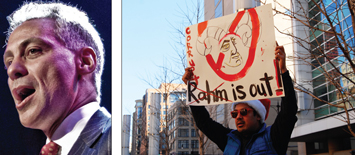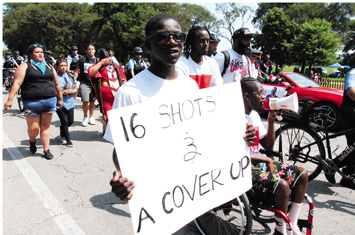Chicago’s political king isn’t seeking re-election, where do Blacks and the city go from here?
By Starla Muhammad -Managing Editor- | Last updated: Sep 12, 2018 - 4:30:46 PMWhat's your opinion on this article?

Chicago Mayor Rahm Israel Emanuel (r) Protest Chicago downtown, Dec. 9, 2015. Photo: Haroon Rajaee
|
Mr. Emanuel announced at a Sept. 4 press conference that he would not run for re-election, leaving a wide open race with candidates and potential candidates vying to become the city’s chief executive. His announcement ushered in a fresh wave of potential shifting political alliances and maneuvering and questions about how Black Chicagoans should approach the upcoming race.

Protestor at Bud Biliken Parade 2018 in Chicago holds sign that refers to police Chicago Mayor Rahm Israel Emanuel shooting of Laquan McDonald. Photo: Haroon Rajaee
|
During his remarks, Mr. Emanuel contended he never shied away from making tough choices and facing hard truths, “even when it hurts.” However, those tough choices and subsequent hurt hit Black communities the most, critics charged.
His announcement came one day before the first day of the murder trial of Jason Van Dyke, the Chicago police officer who shot and killed 17-year-old Laquan McDonald after firing 16 shots at the teen.
The shooting happened in Oct. 2014 but Mr. Emanuel’s decision to withhold releasing police videotape of the shooting for a year sparked outrage and massive protests. Calls for Mr. Emanuel to resign intensified, particularly over the last two years as protests disrupted traffic on major freeways and shopping along downtown’s Magnificent Mile. Demonstrators demanded more jobs and resources for neglected neighborhoods and police accountability, particularly on the predominately Black South and West Sides of the city.
Mr. Emanuel’s announcement garnered reactions from supporters and critics. “The mayor’s decision not to seek re-election is a testament to the will of the people of Chicago who clearly reject his leadership—or in the case of people in many of our most vulnerable communities, lack of leadership. Chicagoans are demanding a new, visionary mayor with the ideas, solutions, experience and commitment to move our city in a better direction,” Amara Enyia, a policy consultant and mayoral candidate, said.

(l-r) Cook County Circuit Court Clerk Dorothy Brown, Dr. Willie Wilson, Garry McCarthy
|
Chicago activist and organizer Kofi Amendola said after initial surprise, he immediately felt “elated.”
“I had a feeling he was going to lose in the upcoming election. I thought that was going to be the upcoming battle, to make sure that he didn’t get re-elected. So, a lot of our energy and focus was on that. When he announced (his resignation), it just really brought home how important and effective grassroots organizing is,” Mr. Amendola told The Final Call.
Chicago’s election is Feb. 26 and a crowded field of at least 12 candidates have already tossed their hats into the ring. Mayoral hopefuls include former Chicago Police Superintendent Garry McCarthy. Under his reign as the city’s top cop, the McDonald shooting and cover-up happened. Mr. Emanuel hired Mr. McCarthy in 2011. He fired him in Dec. 2015 as part of the fallout from the McDonald shooting.
There have been calls for Blacks to begin vetting and coalescing around a single candidate to support. There are several Black candidates running, some more well-known than others, including businessman Willie Wilson; former Chicago Police Board president and federal prosecutor Lori Lightfoot; 23-yearold activist and entrepreneur Ja’Mal Green and Clerk of the Circuit Court of Cook County Dorothy Brown. There is speculation that Cook County Board President Toni Preckwinkle, also Black, may run. Chicago’s first and only Black mayor was the late Harold Washington, elected in 1983.
A complicated legacy, or failed legacy?
Prior to his election as mayor in 2011, Mr. Emanuel, a Democrat, was a United States congressman for Illinois’ 5th congressional district before serving as chief of staff to President Barack Obama. He resigned from that post in 2010 to run for mayor of Chicago. A connection with the country’s first Black president, along with Mr. Obama’s endorsement and support, helped get Mr. Emanuel elected.
His tenure as the Windy City’s chief executive, especially during his second term, was marred by dissatisfaction and anger from residents who criticized many of his administration’s decisions—saying his choices hurt Blacks, who make up nearly 31 percent of the city’s 2.7 million residents.
Despite heavy Black criticism, Mr. Emanuel was heavily supported by the city’s Aldermanic Black Caucus. In 2011, Mr. Emanuel won at least 58 percent of the Black vote in six wards that were more than 90 percent Black. In 2015 support in those wards dipped—ranging from 42 percent to 45 percent, reported the Chicago Tribune. “Rahm Emanuel doesn’t have a ‘complex’ legacy. He was bad, especially to Black people,” @_CharlesPreston posted via Twitter.“Rahm Emanuel will no doubt be remembered, as Karen Lewis so incisively put it, as ‘the murder mayor.’ He oversaw the murder of public schooling, of public housing, of mental health clinics, of jobs in low-income communities and the literal murder of the city’s poor,” posted @MilesKLasin. Ms. Lewis is former president of the Chicago Teacher’s Union.
Support among Blacks also began to wane for Mr. Emanuel in 2013. Citing a $1 billion budget deficit, among other factors, he closed over 50 schools in Black neighborhoods. Since 2011 he was at the helm through a crippling teacher strike, five different public school CEOs and the loss of 32,000 students—30,000 of them Black, observed the Chicago Sun- Times. When he leaves office a $28 billion municipal pension fund crisis, a holdover from the previous administration, will remain. Then, there is a $1.1 billion property tax increase and higher water, sewer and telephone fees, the Sun-Times noted.
His administration was able to convince several corporations to set up shop in the city, including Kraft Heinz, Motorola, Facebook and Google securing additional office space. Mr. Emanuel will leave office with developers breaking ground on a spate of billion-dollar skyscrapers and residential projects, reported the Sun-Times.
Black political self-interest
As Mr. Amendola noted, no matter who is Chicago’s next mayor, he or she has a plethora of challenges. The fight for community revitalization, economic development, investment in mental health services and education, plus alternatives to policing must continue, he said.
“People are looking to put people in office that are going to push our community’s agenda. It’s about progressive policies,” he added. Voters will have to pay close attention to where candidates stand on particular issues, policies and agendas, to see who is going to do the best thing for Black communities and the city as a whole, said Mr. Amendola.
“I’m hoping that we can have forums where people can really interrogate people’s positions because we need that.”
LaKeisha Gray-Sewell, community activist and founder of the Girls Like Me Project, said the upcoming mayoral race presents an opportunity for Black Chicagoans. “We already know what it takes to collectively unify and have one person who represents (us). Not the perfect candidate, but one person who absolutely is representative of our community issues that also benefits and advances a global city,” she said.
“What we know is the quality of life, the well-being, economic infrastructure, education and Black communities across this city, they are the barometer of how well the city will do overall. We know if we get someone who we can collectively get behind then we’ll do well … we’ve done it before and the blueprint has already been laid. If we could just come to grips with that,” she said. She was referring to overwhelming Black support behind the election of Mayor Washington.
Prior to Mr. Emanuel’s first term, a group of the city’s prominent Black leaders attempted to put support behind one candidate, former U.S. senator and ambassador Carol Mosely-Braun. That attempt was unsuccessful for a variety of reasons, and as a result, Mr. Emanuel was elected.
Ms. Gray-Sewell said it will take a coalition of experienced Black elders and young activists and organizers working together to get this accomplished. But is that realistic?
Leonard F. Muhammad, political observer and former chief of staff for Nation of Islam Minister Louis Farrakhan, told The Final Call that Black people must have a “pro-Black agenda.”
“As our numbers are shifting now, where we may not have a majority, we always have enough leverage in order to participate in a way to deliver meaningful benefits to our community. Congressman Gus Savage told me once that ‘politics decides who gets what, how much and when of the government budget,’ ” he said, referring to the fiery, late Illinois politician.
“The share of the government budget is where our people constantly lose where we see the disparities in terms of the planning for development and these kinds of things,” Mr. Muhammad explained.
Blacks must be wary of casting their votes for “protest” candidates and must use their political influence to deliver meaningful results to their communities, he argued.
“Mr. Emanuel not running creates a vacuum. A vacuum can be good if we’re prepared to step into it in an intelligent way. I don’t regret a vacuum, what I would regret is if we don’t step into that vacuum with intelligence in order to fully participate and maybe enhance our position from where we are now as far as politics,” said Mr. Muhammad. Politics is not a panacea for Black people, meaning a solution for all problems, he continued.
Blacks need to broaden their coalition to include intergenerational voices, input and suggestions from young activists leading up to the mayor’s race, noted Mr. Muhammad
“We definitely have to be mindful of who we’re going to put in power to make sure that they’re speaking for the voice of the people and not for their personal agendas and not for financial backers,” said Mr. Amendola.
INSIDE STORIES AND REVIEWS
-
-
About Harriett ... and the Negro Hollywood Road Show
By Rabiah Muhammad, Guest Columnist » Full Story -
Skepticism greets Jay-Z, NFL talk of inspiring change
By Bryan 18X Crawford and Richard B. Muhammad The Final Call Newspaper @TheFinalCall » Full Story -
The painful problem of Black girls and suicide
By Charlene Muhammad -National Correspondent- » Full Story -
Exploitation of Innocence - Report: Perceptions, policies hurting Black girls
By Charlene Muhammad -National Correspondent- » Full Story -
Big Ballin: Big ideas fuel a father’s Big Baller Brand and brash business sense
By Bryan Crawford -Contributing Writer- » Full Story






 Click Here Stay Connected!
Click Here Stay Connected!








